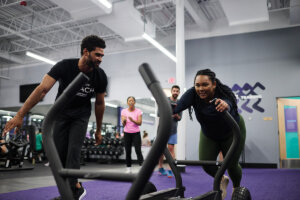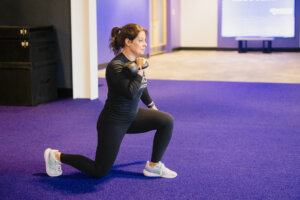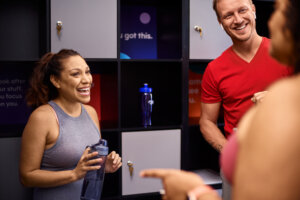In a perfect world, you would listen to every single thing your coach or personal trainer asks you to do and life would be magical and wonderful. But we don’t live in a perfect world which means some of your trainer’s advice gets overlooked. Why does that matter? Fair question! It matters because there are certain habits that help enhance the existing work you’re doing in the gym and in the kitchen. Read on to find out which habits will help you make the most out of your workouts and healthy eating habits!
Moving more with 20-minute workouts
The Department of Health recommends, “150 minutes of aerobic and 75 minutes of vigorous activity” across a week. As coaches, we’re focused on the quality of time spent, and 20 minute workouts with just a few moves can have a big impact on your health. By decreasing the time, we can increase short bursts of intensity which is ideal for burning fat, building strength, and improving cardiovascular function. Most importantly though, these workouts can be done anywhere, anytime!
Here’s an example of workout to complete on a day you can’t make it to the gym.
- 20 mountain climbers
- 10 squats
- 5 burpees
Repeat five rounds and rest as needed.
Making slightly better food choices
Most people know what they’re supposed to eat, but don’t follow through. It’s our job to help clients identify where they’re at. We want our coaching clients to have a healthy inclusive, not exclusive, mindset about food and often that means setting really small, attainable goals to build confidence and comfort with change.
Some ideas to get you started:
- Every time you eat lunch, make sure you include veggies into your meal
- No matter what time you eat breakfast, include a protein
- Any carbohydrate you purchase must list fiber in the nutrition facts
Foam rolling
Flexibility, tissue resilience, and mobility can be greatly affected when fascia is bound up or ‘knotted.’ Fascia is what holds us together! It’s a web of connective tissue formed in bands that wraps around all the internal parts of the body from head to toe and fuses it together. Repetitive motions, prolonged dehydration, or tissue trauma can cause fascia to become rigid.
Rolling tips:
- Rolling before a workout is best for increased range of motion and performance
- Rolling after a workout can reduce post-workout soreness
- Don’t roll at the site of pain. If your knee hurts, for example, don’t roll the knee, instead roll around or below to locate the actual issue
- Rolling treats the symptoms but often not the underlying problems of pain and mobility issues. Rolling combined with balanced training, nutrition and sleep plan is important, too
Practicing self-care for better emotional health
If we had to choose just one action item from this list; self-care would be it!
We all have a default set of feelings and beliefs that form whether or not we believe we can be successful which can be triggered when we encounter obstacles, frustrations and setbacks. Often one “failure” in our fitness past has convinced us we can’t succeed. Self-care is about cultivating strategies to address things like healthy habits and boundaries, vulnerability, failure and success. All things people tend to avoid if possible. Smart self-care is a discipline, and it’s the key to emotional health.
Some things to arm yourself with:
Two-minute self-talk: Studies tell us that even a two-minute distraction is sufficient to break the urge to negative self-talk…in that moment concentrate on something else until the urge passes. Here are some of our favorite things clients say to themselves when they’re feeling down:
- I’m not ok, and that’s ok
- I can be patient
- I love myself
- No turning back now
Putting longevity on your radar
How we age is almost entirely up to us. To ensure your aging trajectory is as functional as possible, you need to begin thinking about how you want to age. The work you’re putting in now will create your future. If you picture yourself playing with your grandkids, traveling in retirement, preventing metabolic dysfunction, and beyond, the time is now to act on your health and fitness. You need a full-spectrum approach that includes a well-rounded training, nutrition, socialization, and emotional resilience. Often, people think about this too late because they make false assumptions about aging. Now, more than ever people are living happy and healthy lives into their 90s.



